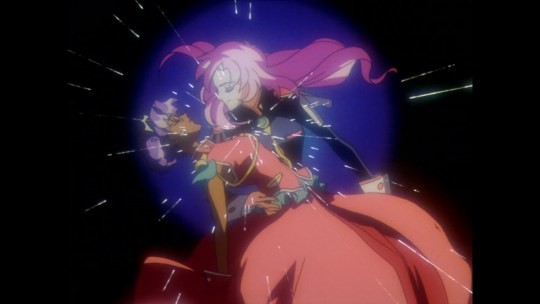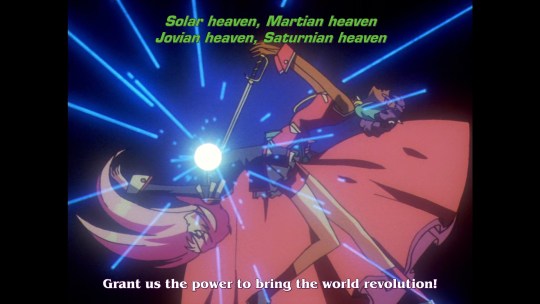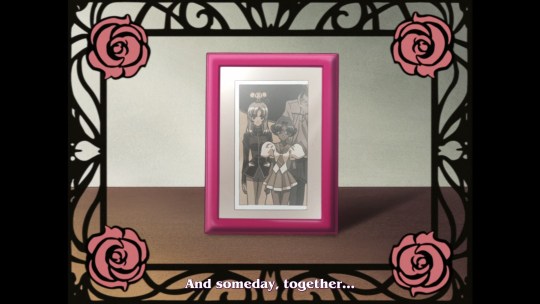#I wrote this mostly on facebook tho if I wrote it here first I'd better integrate images probably
Text
Utena thoughts...about 2 weeks later
I've been putting it off for way too long and so most of my thoughts stopped being fresh. On top of watching way too many analysis vids post-watch, but still I do at least want to put my 2cents of Revolutionary Girl Utena out there for the world.

Utena is perhaps one of the most famous "magical girl"/shoujo action shows out there for not only it's transgressive themes of relationship abuse and low-key pretty much being the poster girl for like actual feminist perspective on/in anime...but also just doing it all in both a heavily allegorical and understated, yet super over-the-top stylish fashion
But that's it's reputation preceding itself, is Utena worth while all these years? The answer is Yes, but it also really shows it's age and budget in pacing and repetition, tho as an appreciator for "behind the scenes" compromises in art, it's more showcasing Ikuhara's talent in working around both taboo and long-form budget constraints with just well-thought out and iconic imagery that - while episodic and formulaic - is just very good at filling the 39 eps with feasts for the eyes.
Utena broadly is about tomboy Utena with memories long ago after her parents died being "saved" by a princely figure like a princess...except she's so enthralled by the nostalgia that instead she becomes a full on Prince herself and receives a dueling ring to fight in the Ohtori Acadamy secret duels for "engagement" to Rose Bride Himemiya Anthy.
Utena is divided between 4 arcs, only the first and last being Manga adapted from hearsay:
1: Student Council Saga
2: Black Rose Saga
3: Akio Ohtori Saga
4: Apocalypse
From back to forth I'd say that Akio + Apoc is more just escalation into the finale while Black Rose being anime original comes off as a glorified side-character study which while complementing the secondary cast, feels like one of those Anime movies that has to say "but if you don't watch this part, it's pretty much optional for the main plot" despite it also actually introducing the most important antagonist within it's margins.

More importantly, it's the Student Council (arc and the actual people) that lay the foundation but also a large part of the show's focus which ironically puts Utena in the background until like almost the finale and some in-between developments, so it's less "Utena (and Anthy Himemiya)'s story" until the very end, but more like a showcase of how fucked up the system at large is (pin in that).
By the Council themselves is:
Kyouichi Saionji: The biggest jobber, like actually introduced as the most despicable loser ep 1 and proceeds to be a complete arrogant joke for the rest of the show. Honestly in another shojo "love" story, they'd find some way to redeem him but semi-compellingly they turn him into like an Aqua-lad type pathetic brat with an inferiority complex to the actual Student head
Miki Kaoru: the naive "nice, non-threatening soft boy" that also just never actually listens to the girls around him. Probably adds more complexity to the whole patriarchal idea on analytic reflection since yeah, the whole "nice guy finishes last" plays up better when the kid comes off as that "ally" energy of wanting to save Himemiya from being the Rose Bride but also low-key won't actually not just do the duels and win her cuz he's that sorta wishy-washy hypocrite. Arguably the least hateable guy in the cast (minus mascot Chu-Chu)
Juri Arisugawa: TRAGIC LESBIAN TRIANGLE LOVE. Probably the biggest point to of both "not-explicitly homosexual" but also really freaking obvious since her entire story is her girlfriend stealing her "boy crush" when actually she was crushing on her and being pretty much frustrated throughout her story as pining most of it. It's quaint by today's standards but also like damn girl, get over her she was like the worst back stabbing bitch (literally if Black Rose counts)
Nanami Kiryuu: SPEAKING OF QUEEN BITCH, it's been a long time since I've watched a High School girl bully and honestly it's kinda refreshing. If Miki is "soft-boy uwu" Nanami is a brat that gets her come-uppance often, featured prominently as an anime only with the MOST filler/comedic episodes but also not low-key, being the most out-spoken actual brother complex ironically spins perhaps the biggest twist and ironic relationships of "I love my brother but not-like-that but also like-that" by the end. Mostly comedic relief but I find her inclusion to actually add a lot more to juxtapose...
Touga Kiryuu: Big Student Council Prez himself, the first arc antagonist and also a strong foil to Saionji and later a stepping stone for Akio. Touga is THE image of a Princely Playboy Heart-Throb that in any other Shoujo romance would have the main girl win him over from all those "other girls" despite him being apathetic if not outright manipulative of them. Good thing Utena is better than that and really puts a spotlight on just not-actually-ok his power hunger for "the power to bring the world revolution" that leads him to heavily objectify Anthy, arguably even more than Misogynist Trophy Girlfriend beater Saionji, since he doesn't even see her as more than a means to an end despite professing and looking the Prince part but lacking all the actual virtues.
The Student council matters more since they're characters and subsequent tragic flaws are the ACTUAL meat of the show and on second rumination actual shows more how fucked up the system/gender dynamic/power hierarchy is since - while it blatantly fucks over Juri who can't just outright say who she likes - also show almost it's own sub-text of Masculine failings: Saionji desperately clinging to being TOXIC MASCULINE™ and completely falling short underneath Touga; Miki's "nice boy" act belying him trying to replace his low-key nostalgia for his sister (also a bitch, but apparently was more like Nanami in the manga); and best yet Touga being the quintessential "Prince in all but actual behavior" by emulating a cutthroat and Machiavellian world view but coming up empty because well, he's just an illusion of a prince...but that leads in way more to the big finale piece where I'll reintroduce the actual story's main trio
Utena Tenjou: Tomboy Prince with brain empty except for lesbian thoughts. Honestly probably what every western "STRONG INDEPENDENT WOMAN" archetype wishes they were since while having very tomboyish personality in athletics, blunt speaking and also VERY oblivious to the actual plot for REAL DRAMATIC IRONY, but also never actually demeaning her being feminine partially due to her love of an childhood prince and how she maintains her relationship with both her friend Wakaba and later Anthy. Honestly mostly a plot device after S1 until she gets ACTUAL development by the very end and instead kinda bumbles her way into undoing the entire REVOLUTION OF THE WORLD. I kinda wish she felt either more cognizant or at least felt like she was developing/properly rebuking the rest of the cast's power obsessions but I guess that's for the movie.
Anthy Himemiya: Actual Trophy Wife with a dark secret (darker than ski- wait no that's terrible scratch that). Set-up very much as an immediate princess in distress while also being the most femme Yamato Nadeshiko, Anthy being the Rose Bride as a literal prize who acts and behaves as whom she's "engaged" with desires while otherwise being quiet, wry, mysterious and noticably submissive, by the end it actually plays up into THE BIG REVEALS of just how abused she's been into a hopeless acceptance...like y'know actual abuse victims.
Akio Ohtori: Grade A Antagonist, probably the most insidious I've seen a villain in a while, Akio is notable for, back in 1997, being perhaps the big go-to of actual deconstructing the facade of a whole shoujo genre's "hots for a teacher/sexy man putting the moves" and highlighting how actually exploitative and abusive a person like that really is. Being Himemiya's brother (somewhat justified in the manga by both being a weird Sailor Moon-esque reincarnation of gods/godesses of Dios), despite how much of his motives are runing the background and how the entire back story is uh...brought up in like barely in the last arc with little lead up (some scenes feel like they'd be a full melodrama season and they just have like 1 scene in the final arc episodes) he manages to one-up Touga (in the plot as well) by instead of "just" objectifying girls, not-just-flat out saying Utena looks best as a princess, but y'know the fact that he is implicitly yet constantly exploiting and victim-blaming Anthy for her own suffering for "the power of Dios/Revolution of the world" turns it on its head

I've spent all this time on characters but in truth a lot of the meat of the show relies again on the Council Members fleshing out the issues of system leading to outright divorcing "being a Prince" (heroic altruistic virtues) and "being a man" (considering like all but maybe the comedic relief have some deliberately misogynistic behavior) and beyond just the plot (or rather character) synopsis, the talent goes far more in how it's framed, the symbolic/allegorical shots, the repetition adding a good episode formula flow to character showcases, probably the most "tasteful" allusion to uh...*ahem* sexual abuse that so many other edgier/prentious shows fumble. Both in how intimidating yet understated it's foreshadowing is until they hard-reveal it despite never explicitly naming it even tho it sends Nanami into hysterics
Really it's both a massive blessing and reason for it's cult beloved status for it's aesthetics but also it's burden, for being a full 39 episodic season by season character development study of everyone BUT the main trio except for snippets and the very end that makes it greatly appreciable as a legitimate work of art.
What I wanted more to say however (long overdue) is that a large part of following is, visibly at least, western feminist critiques and yes while it almost seems like Utena fits the "deconstructing patriarchy" story like a glove...it's weird how almost none of them actually can give a good historical account of actual Japanese female/gender/sexuality norms nor Anime contemporaries actually were. Like Tenchi Muyo and Berserk came out the same year (Cardcaptor Sakura the next) and despite how you can "feel" the influence in lots of modern shows like SHAFT's signature visual imagery cuts or many WESETERN shows having straight scene references to Utena....almost no one has a similar feel to Utena until like Princess Tutu comes out.
Really tho probably should've watched Utena and then Tutu because while it's undeniable that Utena is a major pillar of shoujo re-codification - what with everyone before Utena was saying they thought it'd be like a Rose of Versaille or Lady Knight rip-off...whose laughing now? - it's almost like there's a missing link between it and it's major western fanbase (probably with what few anime did get overseas, this one probably rose to the top), or how very noticeable there IS an influence on it's genre in Japan
Almost none of the big analyst fans actually know A) it's not "a deconstruction of Magical Girls" since despite Ikuhara working on Sailor Moon just before this, almost none of the tropes line up and instead more with Shoujo genre as a whole. or one of the major inspirations was Takarazuka theater.
And this is not to dismiss how inspirational it is to it's western fandom, but while I am notably cynical towards placing things on pedestals, there's probably something about cultivating the whole pop-culture feminist reading commune with people making weird time-loop theories while kinda most of it is just filling in a mad-lib mostly thanks to Ikuhara just keeping things on the vague and letting the audience take away their own perspective.
Again, most of the show is completely sub-textual or visually/symbolically depicted and never stated nor properly defines it's weird key words (End of the World, Revolutionize the World, Power of Dios, Rose Bride, all things said constantly but never really said what they "mean". But that's also perhaps its charm, in it's allegory and very Death of the Author approach, it has definitely allowed it's fan theorizing and appreciation to flourish so there's something there for that.
Ultimately I'd say Utena the TV series is great more so for what it isn't...or rather I should say it's great for not just subverting Shoujo tropes and archetypes for the Japanese audience but also that despite dealing with some very serious and heavy subjects in obtuse and perhaps understated ways for the time, people have allowed it to be put on it's pedestal because they can easily fit it in themselves.
Honestly though, not that a more "straight forward" approach wouldn't detract from Utena but I will say that the movie, Adolescence of Utena, is very much the best encapsulation of what Utena strives to be (for another big blog post) and while the TV series has plenty of time and flexes it's directorial muscles with budget constraints and season pacing UNrestrained, the movie will trim a lot of the fat

#long post#Revolutionary Girl Utena#I haven't actually done my Anime thoughts in a while#Maybe I'll keep this on my main blog this time#I wrote this mostly on facebook tho if I wrote it here first I'd better integrate images probably#anolyso's media time#uh...except now that's on my main blog
44 notes
·
View notes